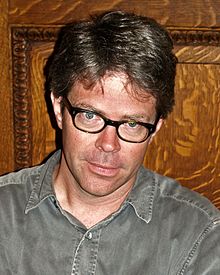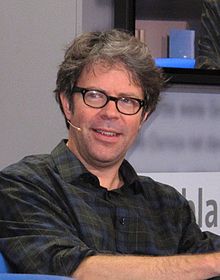Jonathan Franzen
His novel Freedom (2010) garnered similar praise and led to an appearance on the cover of Time magazine alongside the headline "Great American Novelist".
Franzen grew up in an affluent neighborhood in Webster Groves, a suburb of St. Louis, Missouri, and graduated with high honors from Swarthmore College, receiving a degree in German in 1981.
While writing his first novel, The Twenty-Seventh City, he worked as a research assistant at Harvard University's Department of Earth and Planetary Sciences, coauthoring several dozen papers.
Franzen subsequently defended the novel in his 2010 Paris Review interview, remarking "I think they [critics and readers] may be overlooking Strong Motion a little bit.
But this seriousness was leavened by a "great relish for words and writing," adds Kathleen Lawton-Trask '96, a 1994 workshop student who is now a writer and high school English teacher.
In an interview on National Public Radio's Fresh Air, he expressed his worry that the Oprah logo on the cover dissuaded men from reading the book: I had some hope of actually reaching a male audience and I've heard more than one reader in signing lines now at bookstores say "If I hadn't heard you, I would have been put off by the fact that it is an Oprah pick.
[25] In 2011, it was announced that Franzen would write a multi-part television adaptation of The Corrections in collaboration with The Squid and the Whale director Noah Baumbach for HBO.
[30] On October 16, 2009, Franzen made an appearance alongside David Bezmozgis at the New Yorker Festival at the Cedar Lake Theatre, reading a portion of his forthcoming novel.
[31][32] Sam Allard, writing for North By Northwestern about the event, said that the "...material from his new (reportedly massive) novel" was "as buoyant and compelling as ever" and "marked by his familiar undercurrent of tragedy".
[36] On December 6, 2010, he appeared on The Oprah Winfrey Show to promote Freedom where they discussed that book and the controversy over his reservations about her picking The Corrections and what that would entail.
[37] Franzen has stated the writing of Freedom was influenced by the death of his close friend and fellow novelist David Foster Wallace.
"[39] In October 2014, during a discussion at Colgate University, Franzen read a "self-contained first-person narrative" that is part of a novel that he hoped will be out in the summer of 2015.
[41] Jonathan Galassi, president and publisher of Farrar, Straus & Giroux, described Purity as a multigenerational American epic that spans decades and continents.
The story centers on a young woman named Purity Tyler, or Pip, who doesn't know who her father is and sets out to uncover his identity.
[41] In 2016, Daily Variety reported that the novel was in the process of being adapted into a 20-hour limited series for Showtime by Todd Field who would share writing duties with Franzen and the playwright Sir David Hare.
"[51] According to the Times Literary Supplement:Crossroads is largely free from the vices to which Franzen's previous work has been addicted: the self-conscious topicality; the show-off sophistication; the formal heavy-handedness.
Referencing manifestos written by Philip Roth and Tom Wolfe, among others, Franzen grappled with the novelist's role in an advanced media culture which seemed to no longer need the novel.
In the end, Franzen rejects the goal of writing a great social novel about issues and ideas, in favor of focusing on the internal lives of characters and their emotions.
He begins by recounting how some readers felt The Corrections was spoiled by being too high-brow in parts, and summarizes his own views of reading difficult fiction.
[60] In 2004, Franzen published "The Discomfort Zone", a personal essay about his childhood and family life in Missouri and his love of Charles M. Schulz's Peanuts, in The New Yorker.
In an interview with New York magazine, Franzen stated that he had in fact made the translation for Swarthmore College's theater department for $50 in 1986 and that it had sat in a drawer for 20 years since.
"[62] Franzen published a social commentary on cell phones, sentimentality, and the decline of public space, "I Just Called To Say I Love You" (2008),[63] in the September/October 2008 issue of MIT Technology Review.
In 2012 he published Farther Away, a collection of essays dealing with such topics as his love of birds, his friendship with David Foster Wallace, and his thoughts on technology.
It consists of three major essays by the "Perennially ... impossible to translate"[65] Austrian "playwright, poet, social commentator and satirical genius"[65] Karl Kraus – "Heine and the Consequences" a takedown of the beloved German poet, "Nestroy and Posterity" which established that playwright's reputation in Austria to this day, and "Afterword to Heine and the Consequences"".
[66] According to advance press for the book, the collection "gathers essays and speeches written mostly in the past five years, [and] Jonathan Franzen returns with renewed vigor to the themes—both human and literary—that have long preoccupied him.
Whether exploring his complex relationship with his uncle, recounting his young adulthood in New York, or offering an illuminating look at the global seabird crisis, these pieces contain all the wit and disabused realism that we've come to expect from Franzen.
Taken together, these essays trace the progress of a unique and mature mind wrestling with itself, with literature, and with some of the most important issues of our day, made more pressing by the current political milieu.
[71][example needed] In an interview with Transatlantica conducted in March 2018, Franzen mentioned that he had just started work on a new novel, having recently sold it to publishers on the basis of a three-page proposal.
[72] Later that year, in a profile piece for The New York Times Magazine in June 2018, Franzen confirmed that he was currently at work on the early stages of his sixth novel, which he speculated could be his last.
[85] In 2010, at an event at the Serpentine Pavilion in London celebrating the launch of Freedom, Franzen's glasses were stolen from his face by a gate-crasher, who jokingly attempted to ransom them for $100,000 before being apprehended by police elsewhere in Hyde Park.


